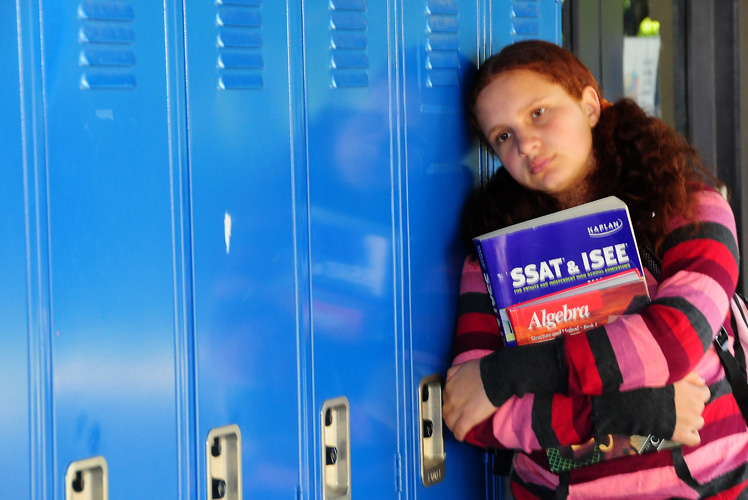Between half a dozen Advanced Placement classes, tests, essays, obsessions over class rank, SAT prep, basketball practice, piano lessons, etc., high school students are worse off than ever. One documentary says it doesn’t have to be that way.
On Saturday, The UCLA Family Commons, a project of the UCLA Semel Institute for Neuroscience and Human Behavior, will present “Race to Nowhere,” a documentary directed by Vicki Abeles, at the Skirball Cultural Center in Santa Monica.
The film focuses on the stress felt by young people as they struggle to meet the expectations of a competitive, success-driven society.
“A couple of years ago, I saw the toll the stress of school and our culture was taking on my kids,” Abeles, who had laryngitis as of press time, said in an e-mail. “I attended a parents’ evening where the issues were discussed but life returned to normal the next day. There were no changes. I felt powerless.”
The film follows Abeles across the country as she interviews students, educators and psychologists on the effects of high stress lifestyles on American schoolchildren. Abeles also chronicles the hectic lifestyles of her own children.
Through these interviews Abeles shows results of students pressured to take on too much: namely stress, burning out, sleep deprivation, physical illness and, in some cases, death.
“Race to Nowhere” is Abeles’ way of addressing the issues faced by children, both hers and others, as they juggle extracurricular activities, full course loads and the pressure to matriculate into a top school.
“I thought about the power of media in our culture and the opportunity a documentary would provide to raise large scale awareness and create the political will to transform, not reform, education, redefine success for our kids and make their health and well-being a national priority,” Abeles said.
Students experience the push to succeed as early as elementary school.
Though they may not yet have an understanding of the concept of college, elementary students understand meeting standards, according to Alison Bailey, a professor of psychological studies in education with the UCLA Graduate School of Education and Information Studies.
“Even kindergartners have to meet certain standards. Every state, under No Child Left Behind, had to create standards for all their grade levels,” Bailey said in reference to the 2001 legislative act based on the theory that holding students to high standards will improve individual results.
“We’ve pushed down standards so that today, many are expected to read by the end of kindergarten rather than allowing a child to reach this stage when he or she is ready developmentally,” Abeles said.
The UCLA Family Commons endorses this film because it addresses issues close to the organization’s mission statement.
The commons aims to help families achieve a state of well-being, which often conflicts with the stress caused by a strenuous workload.
Terry Lowe, a project manager for the commons, said she believes families struggle from an ability to manage all the pathways to success offered to their children.
“A lot of families seem to be suffering from what we like to call “˜too much,'” Lowe said. “Everyone wants their children to have as many opportunities as possible, … but sometimes we have too many opportunities.”
“Race to Nowhere” ends with a call to action, asking parents and educators to take the first steps to overhaul the education system. The film asks parents and educators to put their children before ambition.
“It takes courage to do what we know instinctively is the right thing for our kids,” Abeles said. “Fear has driven us to this point, and it’s going to take parents and educators being fearless and putting the kids’ needs at the center of the conversation.”
Abeles said she expects the education system to be reformed by those who experienced it firsthand, specifically students who worked hard (sometimes a little too hard) to get into highly ranked schools such as UCLA.
“We believe that many of the solutions will come from young people in college who are the products of this broken system,” Abeles said.
Current college students may also find come comfort in seeing students from around the country share their experiences.
Though the film focuses on middle school and high school, it acknowledges that the race does not end with a college acceptance letter.
“For students still struggling to meet unreasonable ends, (the film) allows them to see their struggles are shared widely so they don’t feel isolated,” Abeles said.
“Perhaps it also gives students the space to redefine what success means to them.”
